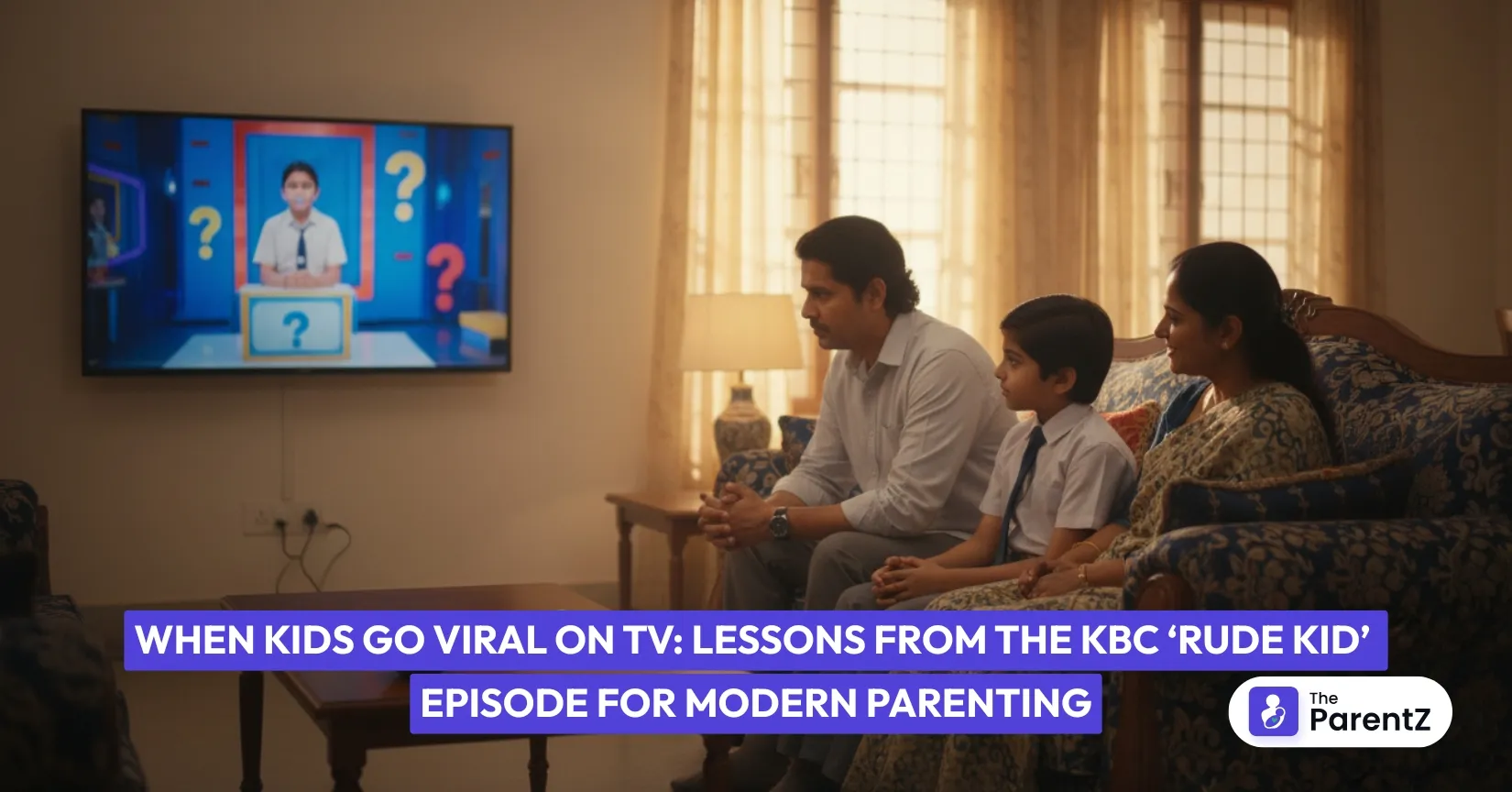Every parent knows that children sometimes say or do things that make us both surprised and uncomfortable, especially in public. But what happens when that “public” becomes national television?
A recent episode of Kaun Banega Crorepati 17 (KBC 17) reminded us just how quickly things can spiral in today’s age of social media.
What Happened on KBC?
A 10-year-old boy from Gujarat, Ishit Bhatt, recently appeared on KBC 17 and won the Internet’s attention, not for his answers, but for his attitude. In the show’s clip that went viral, he confidently told Amitabh Bachchan not to explain the rules because he “already knew them.” He impatiently demanded that options be displayed.
While the child’s statements seemed cheeky to some, others found them disrespectful. Many online users reacted harshly, calling the behaviour “rude.” But as parents, it’s important to pause and not to judge the child, but to ask: What led to this? What can we learn?
Let’s Remember: He’s Just a Child
Before anything else, we must remember that Ishit is only ten years old, still learning what’s right and wrong, and still shaping his sense of self and confidence. It’s easy for grown-ups online to label a child, but no child deserves to be trolled or publicly shamed for a mistake.
Children often mirror what they see, hear, and experience. If they are praised mainly for being outspoken or fearless but not guided about empathy or tone, they may not realise when confidence turns into arrogance. That’s not mischief; it’s simply unrefined confidence that needs direction, not ridicule.
What Parents Can Learn
This episode isn’t about one boy; it’s a mirror for many of us raising children in a fast, showy, screen-filled world.
- Confidence needs grounding: We all want our children to be confident. But true confidence also includes respect, humility, and patience. Teach your child that strength is not in speaking loudly; it’s in knowing when to pause and listen.
- Social behaviour starts at home: Politeness and empathy are not just school lessons; they grow from how we speak at home. When we interrupt, dismiss, or speak harshly before our children, they learn that’s acceptable.
- Applaud effort, not attitude: Many parents love when a child “talks smartly” or “shows leadership,” but it’s how they express themselves that matters most. Praise their curiosity and bravery, but gently correct the tone when it slips.
- Overconfidence is a Blind Spot: When Ishit said, "Don't explain the rules to me," he was so confident he knew everything. But that same overconfidence made him answer incorrectly. We need to teach our kids that it's okay to not know everything. It's okay to listen. It's okay to be humble.
- Watch for Warning Signs: If your child frequently interrupts, dismisses others' input, or shows impatience with adults, don't brush it off as "oh, they're just confident." Address it. Gently but firmly.
Lessons from Amitabh Bachchan’s Response
One beautiful part of the KBC moment was Amitabh Bachchan himself. Even when interrupted, he remained calm, kind, and composed; gently remarking, “Kabhi kabhi bachhe over-confidence mein galti kar dete hain” (Sometimes children make mistakes out of overconfidence).
His reaction holds a golden parenting lesson: when children misbehave, don’t match their energy. Respond with calm authority. A parent’s poise in the face of misbehaviour does more teaching than a lecture ever could. Children notice tone, not just words.
The Apology That Followed
A few days after the episode aired, Ishit Bhatt posted a heartfelt apology on social media. He explained that he didn’t mean to be rude; he had been nervous, and things came out the wrong way. He even thanked Amitabh Bachchan for being kind and patient.
That apology itself shows tremendous growth and reflection for a 10-year-old. It proves that with gentle correction and family support, children can recognise their mistakes and strive to do better. After all, parenting is all about helping our children turn missteps into lessons.
The Bigger Picture: Parenting in the Age of Virality
As parents, we now raise children in a world where even small moments can become viral. A sentence, a gesture, or a behavior caught on camera can shape public opinion. This makes our job harder but also more important. Here’s how we can adapt:
- Model humility daily: Admit mistakes, apologize, and talk about emotions openly.
- Teach emotional awareness: Help your child recognize when they’re being impatient, anxious, or overexcited.
- Monitor online exposure: Balance creativity and privacy. A little protection from the online crowd can go a long way.
- Encourage reflection after every public moment: Whether it's a school event, a speech, or a video, ask them how they felt about it and what they might do differently next time.
Conclusion
It’s easy to sit on the other side of the screen and pick on a child’s mistake. But every parent knows that even one emotional moment can make any child look impolite or careless. What matters more is how we guide them afterward.
The Ishit Bhatt episode isn’t a lesson in embarrassment. It’s a reminder that children absorb confidence quickly, but learning grace takes time, and that time must be given with affection, not anger.
As Amitabh Bachchan showed, calm parenting starts with calm adults. When children “go viral,” our first thought shouldn’t be judgment; it should be empathy. Let’s raise confident kids who also know how to be kind, humble, and thoughtful in every space, online or offscreen.





Be the first one to comment on this story.